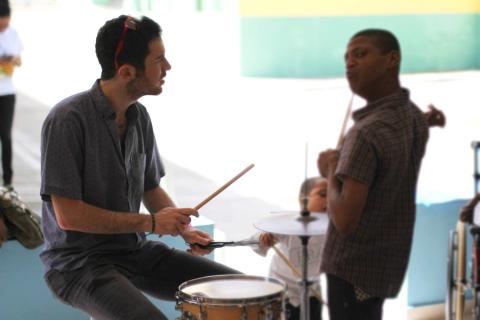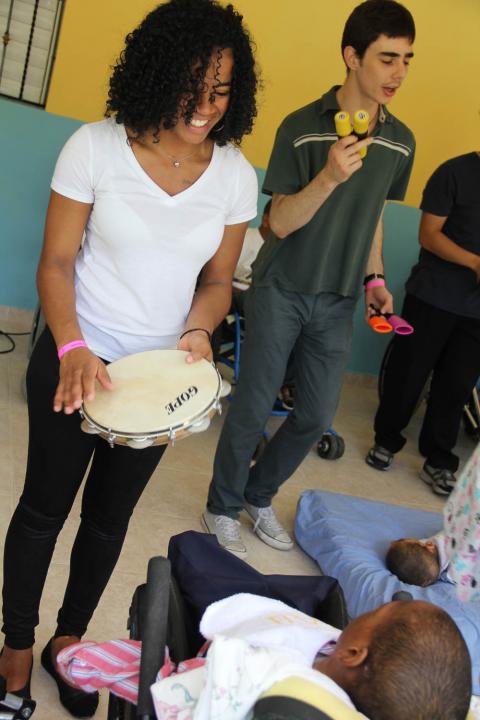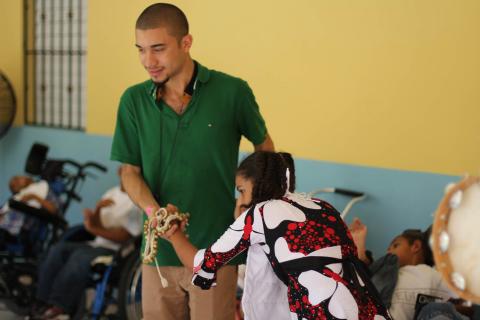Developing Musical Ambassadors for Social Change

Percussionist Noam Israeli interacting with children in the Dominican Republic

Negah Santos plays the tambourin with a child in the Dominican Republic

Edmar Colón helps a student in the Dominican Republic
Saxophonist Edmar Colón, a 22-year-old alumnus studying with the Berklee Global Jazz Institute (BGJI), smiles as he recalls a program-sponsored outreach trip to Africa.
“I come from Puerto Rico and we Latin people have this problem—we look at our musical history as a possession. Bomba is from here. There’s this great sense of entitlement sometimes,” he says. “But when we went to Africa, it was obvious to me that these things that I thought were mine were actually from this place.”
Colón recounts a percussion class that quickly evolved into a crosscultural jam. After the session, the visiting percussion instructor, Peruvian drummer and Berklee alumnus Jorge Pérez-Albela '97, approached an African musician and thanked him for sharing the local sound. The man replied, “These rhythms aren’t mine, they’re from the earth.”
Colón laughs. “It’s all one beat,” he says.
Music—the universal language, the one beat—empowers the students and faculty of the BGJI. The BGJI harnesses this power to challenge the status quo and make a difference in the world, one performance at a time.
The program doesn’t simply turn out talented musicians, it develops musical ambassadors, unique players with enough compassion and practical knowledge to understand that the music they play can transform lives and better the global community.
Homeless shelters, hospitals, nursing homes, orphanages, and cash-strapped community centers are the training grounds for students at the BGJI.
Each year, students take part in a variety of outreach activities. From afternoon concerts at Boston-area assisted-living centers to workshops for young, impoverished musicians in Panama City, Panama, BGJI students commit their time and talent to improving lives.
Chilean saxophonist and music therapist Patricia Zarate coordinates outreach operations at the BGJI.
“We want the students to experience real-life situations that don’t happen in their everyday lives,” says Zarate. “These experiences are intense—musically, intellectually, and emotionally.”
Take the E Train
Susan Bailis Assisted Living, at 352 Massachusetts Avenue, has been a customary stop on the program’s local outreach circuit since 2009. Students spend a few afternoons per month playing jazz standards for the residents. It’s not an easy gig.
“[The residents] know the music in its essence—the lyrics, the sonority—because they lived it,” says Colón. “These performances force you to understand the history behind the music you’re playing.”
The Susan Bailis sessions also require students to grapple with nonmusical issues such as the physical and mental afflictions that affect the audience members. It’s in these emotionally charged moments that the students begin to the understand power they posses and responsibility entrusted to them.
“Some of [the residents] are completely lucid, some aren’t, but when you play, they’re all there,” says Colón. “They have this visceral experience of reconnecting with their consciousness. These people are transported to their pasts in a specific way. The songs we play in the standard jazz repertoire—“Take the A Train,” “Body and Soul”—evoke memories and emotions.”
“These are heavy things,” he says. “You start to evaluate life differently which makes you play differently. It’s not all about playing hip, musical stuff. You ask yourself: how can I be a better human?”
Suzanne Aiken is resident life director at Susan Bailis. She sees the impact these performances have on the residents.
“It’s almost a spiritual experience,” she says. “Their bodies may be be failing them but the music speaks to their spirits and brings out that inner youth.”
Music isn’t the sole reason Aiken continues to invite BGJI students to Susan Bailis. Social interaction is another important part of this arrangement.
“When [the students] are finished, they stay,” says Aiken. “They take the time and connect, and the residents find them approachable. The way they interact is just wonderful.”
Passport, Please
International trips are key to the BGJI outreach program.
This past November, the students traveled to the Dominican Republic. The itinerary included a few performances at the 2014 Dominican Republic Jazz Festival and stops at community centers and hospitals in the Puerto Plata province.
Percussionist Noam Israeli, a 26-year-old senior from Israel, played the drum set during the trip.
“Some of these people can’t talk,” says Israeli. “Communication is based on the look in someone’s eyes, a touch. These situations give the music a different meaning. It’s not just entertainment anymore. It energizes them, makes them react.”
Musical clinics are another key aspect of these international excursions. During these workshops, which are usually organized for young musicians belonging to low-income families, BGJI students empower future generations of players. And, while the classes are fun and interactive, music isn’t presented as a mere pastime. The students frame it as a life-altering tool, a viable skill that can be used to improve social and economic mobility.
Senior percussionist Negah Santos discovered music’s transformative power as a teenage student at Meninos do Morumbi, a music education center in Sao Paulo, Brazil.
“Music was presented to me in such a beautiful way, as something that could change your reality,” says Santos. “I saw people dying in [Meninos do Morumbi] but I also saw people doing well. It wasn’t only about music, they also go to college and have their own families. They moved out of the poor neighborhoods and music put them on that track.”
At one point during the Dominican Republic trip, Santos found herself looking back at her past. The one beat had returned her to where it all began.
“I met these little girls; they were playing percussion on trash cans,” she says. “They were amazing and I could see, in their eyes, that they had bright futures but they needed someone to guide them.”
Since its inception in 2009, the BGJI has committed its resources to developing world-class, socially conscious artists determined on bettering the human race, a global community united by one unstoppable beat.
